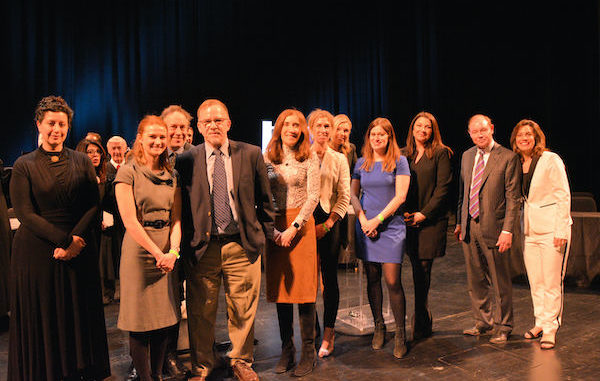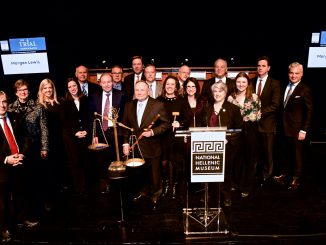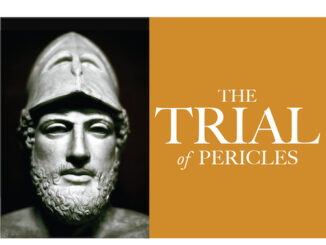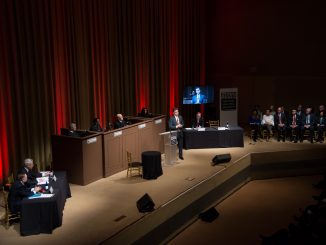
On March 5, 2020, The National Hellenic Museum sponsored the 7th mock trial in a series that has brought together renowned judges and lawyers as well as public and private citizens who have participated, earned continuing legal education credit, and simply enjoyed the entertainment normally only available in a court of law.
This exercise, held at The Harris Theatre for Music and Dance, 205 E. Randolph Drive, Chicago, explored the role of the mythical/historical figure Helen of Troy, (actually Helen of Sparta), she of the so-called “face that launched a thousand ships” as the instigator of the 10 years long Trojan War. The question before the Court: Was Helen a victim or an adulteress; was she a traitor?
Six distinguished attorneys- Robert A. Clifford, Dan K. Webb and Pamela Stratigakis for the prosecution, and Patrick M. Collins, Tinos Diamantatos, and Patrick J. Fitzgerald for the defense, gave opening statements, interrogated Helen, played by Jane Monzouras and presented closing arguments; Andrea Darlas moderated.
Presiding over the event were two U.S. District Judges, The Honorable Charles P. Kocoras and The Honorable Anthony Kyriakopoulos, and The Honorable Anna H. Demacopoulos of The Cook County Circuit Court. “Being part of the NHM Trial Series is a delight,” said Judge Kocoras, who has served as a presiding judge throughout the Series. “The historic topics we explore bridge our current trial process to its ancient roots, and often have parallels to issues we face today.”

In fact, the issues brought to the fore in this case included; 1) Which side has the burden of proof, and how does that play out when a defendant willingly takes the stand yet is the only witness; 2) What is the meaning of hearsay; 3) How the “Me Too” movement could impact a trial for treason and 4) The admissibility of such quasi-scientific concepts as the Stockholm Syndrome and the effects of prior sexual trauma on memory (so-called “repressed memory.”)
The jurors offering opinions before the audience-jury casts its votes included Cook County Public Administrator Lou Apostol, ABC-7 Chicago Anchor Ravi Baichwal, Author and Journalist Mark Caro, WGN-TV Reporter Meghan Dwyer, Chicago Tribune Columnist Heidi Stevens and Northwestern University Department of Classics Fellow Jennifer Weintritt, Ph.D. All the jurors got to stand and express the reasoning behind their votes for guilty or not guilty. Guests were also invited to participate by submitting their guilty or not guilty vote to literally tip the scales of justice on the stage and make their verdict count.
Background and adduced facts:
In Greek mythology, Helen was said to have been the most beautiful woman in the world; she was believed to have been the daughter of Zeus and Leda, and was the sister of Clytemnestra, Castor and Pollux, and others.
She was married to King Menelaus of Sparta but was allegedly abducted by Prince Paris of Troy after the goddess Aphrodite promised her to him in the Judgement of Paris. Or did she run off with him, driven to abandon husband and daughter by Paris’ own considerable good looks?
Either way, her liaison with Paris resulted in the Trojan War when the Achaeans set out to reclaim her.
Elements of Helen’s (putative) biography come from such classical authors as Sappho, Aristophanes, Cicero, Euripides and Homer- in both the Iliad and the Odyssey- and her story reappears in Book II of the Aeneid of Virgil. In her youth, she was abducted by Theseus; this carrying off and the alleged rape and abuse she suffered at Theseus’ hands was made much of by the defense; in the words of Patrick Collins, “Her, too!”
A competition between her suitors for her hand in marriage saw Menelaus emerge victorious. An oath sworn by all the suitors known as the Oath of Tyndareus required all of them to provide military assistance to the winning suitor, whomever he might be, if she were ever stolen from him. It is the obligations of this oath which precipitated the Trojan War. Helen’s knowledge of the Oath and the sworn fealty forms much of the basis for the allegations of treason lodged against her.

It’s important to note that Helen was quite young when she married Menelaus; the reports of her departure for Troy with studly Paris are ambiguous in the varied reports- some scholars believe that is deliberate. In any event, relying only on legends written long centuries before the trial proved disastrous for the prosecution, and highly instructive for the jury: it was about as clearcut a demonstration of the meaning of hearsay as any audience in court or auditorium will ever see. Hearsay is an out-of-court statement introduced to prove the truth of the matter asserted; it does not, therefore, carry with it indicia of reliability. Where, as here, the scribes/scribblers were long dead and could not be interrogated on the stand, the accusations against Helen lost virtually all of their punch.
And those legends about Helen are themselves contradictory: Homer characterizes her as a sorrowful figure who came to regret her choice and wished to be reunited with Menelaus. Other accounts reveal a scandalous, treacherous Helen who even tried to lure the soldiers out of the Trojan horse to their doom by using her gifts as a mime to mimic the voices of the officers’ wives; Bob Clifford made much of this awful scheme.
The Helen who took the stand was not a very credible witness, as was pointed out by several jurors. When vigorously interrogated by Strategakis- instead of answering challenges directly, she often responded, “Well the author said that”- and once even claimed she had no memory of the fact at issue.
Whether sinner or sinned upon, the prosecution had almost no chance to convict Helen. Not only is this a woman whose beauty inspired artists of all times to fashion images of her as the personification of ideal human beauty, but not one witness took the stand against her. Finally, who- in this day and age- would risk “slut-shaming” Helen?

Significant moments at the trial:
Robert A. Clifford in opening statement for the prosecution, “Let’s examine the context of this individual: Helen is not an ordinary person. She has divine powers which she used in committing her crimes. It’s the background of who she is that speaks to her iniquity. Her conduct was a selfish dalliance that caused a war- this was the tryst that launched 1000 ships.”
Patrick M. Collins in opening statement for the accused: “Helen was first and foremost a mother and a survivor; she played a part in order to survive. Intent is critical here. Bob Clifford’s quotes from historical authors are fake news. Helen was considered property; her beauty was the cause of her trauma. Prince Paris ran a beauty contest; such people can become corrupt.”
Helen of Troy:
Under direct exam by Tinos Diamantatos: “I was raped by Theseus. Paris the Trojan Prince also abused me; he abducted me to Troy.”
Under cross exam by Pamela Strategakis: “Yes, I had a lot of independence in my marriage; I married very young. I couldn’t take my eyes off Paris, but I don’t remember leading him into my husband’s palace and allowing him to sit on my husband, Menelaus the King’s special chair. As to all the other accusations, that’s what THEY say!”
Dan K. Webb in closing argument for the prosecution: “The only issue is whether, when Helen went to Troy with Paris, she did so willingly. She chose to get on the witness stand. The only point to judge is her credibility. She could’ve told the story of what happened, yet she provided no details whatsoever. When asked about the most crucial fact, she said, ‘I don’t remember!’ Her own direct exam establishes that she is not credible. There is one witness in this case, and one issue: you get to judge.”
Patrick J. Fitzgerald in closing argument for the defense: “Queen Helen is not and has never been a traitor. If she was divine, the trauma would have had no impact. Look at what history has said about her and realize Sappho wasn’t there, she had no opportunity to observe. Homer contradicts himself. Coluthus, who missed the events by 1300 years, actually got it right; his book is entitled ‘The Abduction of Helen’. And Herodotus wrote, ‘She was taken by violence.’ Listen to the witness who was actually there.”
Tinos Diamantatos in rebuttal/summary for the defense: “We have 3 tools with which to evaluate the merits of a case- the evidence, the applicable law, and our common sense. It is Paris who is responsible for the Trojan War, not Helen. Dan Webb is attempting to burden shift- it is the prosecution who has the burden of proof, and they failed to meet that burden.”

After the jury was polled, only one member cast a vote for conviction. The audience/jury similarly voted overwhelmingly for Helen. The Judges, likewise, spoke eloquently in favor of acquittal.
His Honor Judge Kyriakopoulos: “There was no proof here of a lie. Helen never met the poets. Aphrodite was the instigator of the quid pro quo here; she got a golden apple and thus Paris got Helen.”
Her Honor Judge Demacopoulos: “Speak your truth. Be brave and remain beautiful.”
His Honor Judge Kocoros: “The evidence as to influence is in conflict. There is a psychological phenomenon known as The Stockholm Syndrome in which the hostages develop sympathy for their captors; this could have been at work here.”
The focus of counsel:
This reviewer had the opportunity to interview 3 of the participating lawyers. On the eve of trial, I spoke with the celebrated Bob Clifford, certainly one of the most distinguished lawyers in the country; afterwards, I spoke to Pamela Strategakis and Tinos Diamantatos, both well-known, well-recognized and formidable trial lawyers. All 3 expressed similar views on why participating in this exercise is a joy and a privilege.
“The trial series furthers the good work of The National Hellenic Museum in promoting the values of Greek culture; Greece was the fount of democracy as we know it today. It’s a great chance to be ‘in the trenches’ with very fine lawyers, and an educational experience for me,” said Bob Clifford. “It’s also a diversion, quieting to the mind, and more interesting than sorting through tons of Boeing documents.”
“The crux of my career has been my work as a trial specialist in gender-based violence cases, so the case was on-point with my own interests, although it was daunting for me personally to be on the side prosecuting Helen. I was honored to be asked and to sit at counsel table with such great colleagues”, said Strategakis.
Added Diamantatos, “I look forward to this every year for one paramount reason- my love of trying cases! Whether real or mock, I will always jump at the chance to practice my craft in front of a willing audience.”
The National Hellenic Museum (NHM) portrays and celebrates Greek history and the Hellenic legacy through educational classes, exhibits and programs. With a growing repository of over 20,000 artifacts, the Museum catalogs and highlights the contributions of Greeks and Greek Americans to the American mosaic and inspires curiosity about visitors’ own family journeys through cultural expression, oral history and experiential education. Located in Chicago’s Greektown, the NHM provides lifelong learning for the whole community using artifacts and stories to spark inquiry and discussion about the broader issues in our lives.
For more information, visit http://www.nationalhellenicmuseum.org or call 312-655-1234. Follow NHM on Facebook, Instagram, and Twitter.




Be the first to comment